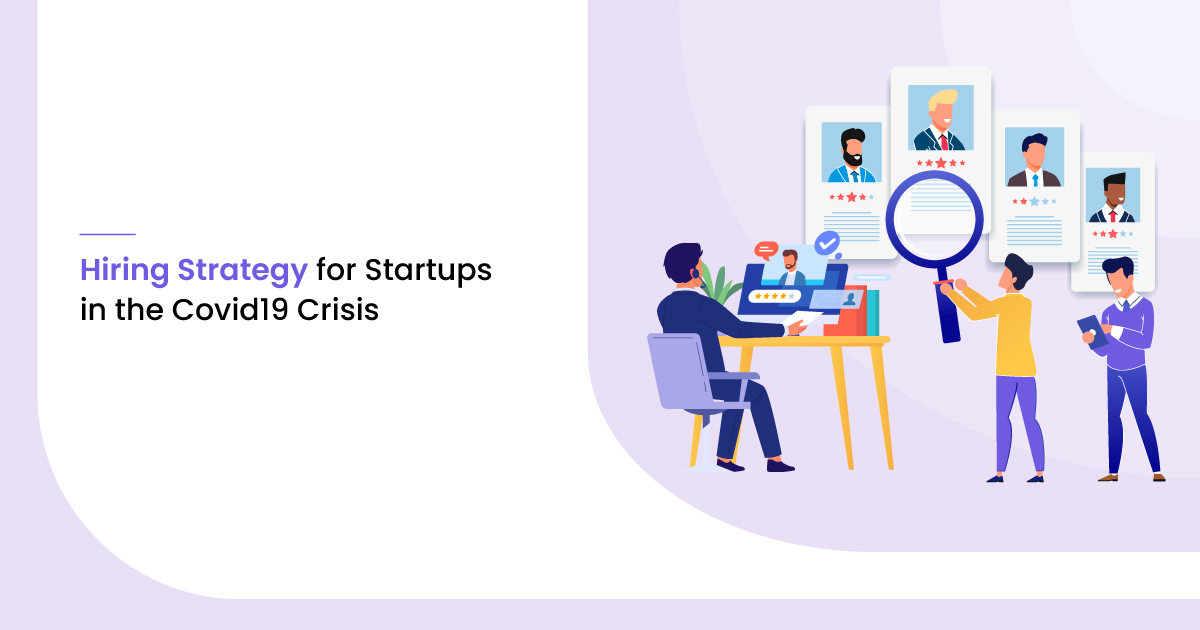Many corporates are shifting the recruitment strategies to virtual platforms. In fact, more than 98% of the Fortune 500 companies have already adopted to be dependent on recruitment software. At the same time, companies incur costs of $3000-$4000 per hire with an average hiring time of 3 weeks or more.
Such massive costs are sustainable by well-established companies, but startups are hit hard in the gut with their shoestring hiring budgets during the COVID-19 crisis. Since startups don’t have much traction compared to other established organizations, this unforeseen disruption has forced them to resort to intelligent automated systems that allow for virtual screening solutions instead of having in-person meetings or interviews.
There are specific questions that the HR and hiring managers of a startup need to ask themselves – how companies can turn around their recruitment marketing strategies. Secondly, how to shift processes on an HR technology to stay ahead of the curve?
This article will help the HR understand –
- Various hiring strategies for startups during COVID-19 crisis
- What steps to take while avoiding to lose on top talents
- Find ways to bolster their employer brands to attract high-quality leads during the quarantine crisis
Finding the answers to these questions is essential because it will decide the future of most startups post-COVID 19. So, let’s discuss some of the hiring strategies for startups to use.
7 Hiring Strategies to Give Startups a Home Run
1. Hire for Critical Business Functions
With the second wave that came around mid-June, increasing the number of COVID-19 cases, more and more companies are either canceling or postponing their physical interviews until December or later. Experts suggest that nearly 60-65% of interviews are getting delayed, especially in service sector industries.
However, this has also been disrupting business operations even while the lockdowns are entailed worldwide. During such a crisis, startups don’t have to bring their entire function to a standstill. Instead, they can focus on onboarding candidates virtually and leverage digital solutions to initiate engagement.
Once hired, virtual meeting platforms and other feasible working practices can easily optimize work management.
2. Calculate the Cost/Benefit Per Hire Before you Recruit
Hiring takes time. Before you hire, consider one of the best practices for recruiting employees: calculating the costs and benefits per selected candidate. Various costs involved while hiring –
- Recruitment time cost
- Cost of administrative officers and managers involved in hiring
- Administrative expenses linked to the process of hiring and training
One of the rookie mistakes most startups make is that they don’t consider the potential costs and benefits of hiring a new employee. They need to understand how a person will increase their earnings to cover their salaries and benefits.
Of course, employees might need training first when they join. But if they don’t start contributing to the ROI right from their joining, then they shouldn’t be in the organization in the first place. Hiring on anticipated growth is a big mistake.
Startups usually hire a resource without putting much thought into the type of role the candidate can fulfill for their business. Hence, while hiring a person, the acquisition managers must justify the cost of hiring them when the recruits start contributing value once hired.
3. Hire Freelancers Where You Don’t Need Full-Time Employees
More often, startups hire a full-time employee when they have a function that needs to be filled.
But before jumping to hire full-time employees, various factors need to be considered. The hiring manager needs to know –
Can a company afford to pay a new hire?
Can the job be fulfilled by hiring a freelancer or independent contractor instead?
Knowing these things is essential for formulating a hiring strategy for startups.
Besides, even if, as a startup, you can afford a regular employee, you might still want to consider working with freelancers to save hiring hassles and cumbersome paperwork. You will also see that entry-level freelancers are ready to join a fast-growing startup even as interns or consultants. All these factors today have led to an increase in work for freelancers during the COVID-19 crisis.
4. Conduct Online Assessment to Test Their Skills
Before the COVID-19 situation, the online assessment was practiced only by big companies to help filter out hundreds of applicants. However, online assessments have become a part of the hiring process, especially for IT and app development roles.
These online assessment rounds can help figure out the entire interview process that follows. It can help filter candidates that are not suited for the role, ultimately helping speed up the recruitment process.
5. Resort to Virtual Platforms
Since it needs the hours to avoid contact with any person and maintain social distancing, the same can be implemented in the hiring process by shifting from face-to-face meetings to telephonic or video calls.
Having video interviewing software has become a must for every organization. Tools like Zoom or GoToMeeting are convenient for conducting video conferences but don’t fulfill the interviewing needs.
Startups can use online HR software so that recruiters can conduct virtual interviewing platforms for a quality interview while also enhancing the candidate’s experience. Here’s how the recruitment software market size and industry forecast looks like until the year 2025.
In fact, it is estimated that video users will make up 80 percent of internet traffic by 2021. Hence, it is necessary to utilize the latest trends in a startup’s hiring strategy because digital interviewing will become the future beyond the COVID-19 crisis.
6. Use Data to Optimize Your Hiring Strategy
Startups face one of the biggest failures in hiring the right candidate as compared to well-established firms. It’s because they tend to hire too fast.
Time plays a vital role in recruitment strategies. If you hire too slow, it might affect the business process and even cost you money. Whereas, when you hire too quickly, you won’t get the best people for the position.
That’s why managers need to get the timing right. They can use their hiring process’s previous data to measure the optimal time frame required to fill up a position. This is necessary to conduct an effective recruitment process.
7. Have a Strategy to Attract the Best Cultural Fit
When you hire the best, you mostly focus on their technical skills and whether they will fit your company culture or not. Now with quarantine hires, you still shouldn’t think otherwise. Even though the new joiners might be working from home, they still need to take directions and orders from their seniors and various co-working departments to help align their skills with the goals.
The best strategy is to stay honest about your company culture. While promoting your employer brand, convey real information about your company’s work culture.
Candidates won’t apply if you boast too much about your work culture despite hiring them for a work from home position. Showcase how things were before the pandemic. It saves time and effort for both the applicant and the hiring manager in making the right decision.
Wrapping Up
Many companies might be in the hiring freeze during this pandemic situation. But they still need to ensure that they have a solid pipeline of talent prospects once the pandemic is over.
That’s why the hiring strategy for startups should include building a powerful employer brand to attract top talents. These were our insights on hiring strategies to help startups in this global pandemic.
Do you think we missed any strategy that you might be observing in your company? Let us know in the comments below.
Need Any Technology Assistance? Call Pursho @ 0731-6725516




